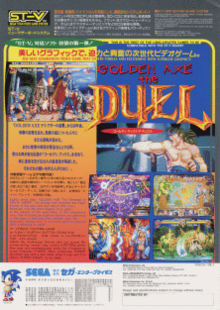Golden Axe: The Duel
| Golden Axe: The Duel | |
|---|---|
 | |
| Developer(s) | Sega AM1[1] |
| Publisher(s) | Sega |
| Composer(s) | Kazuhiko Nagai |
| Series | Golden Axe |
| Platform(s) | Arcade, Saturn, GameTap |
| Release | Arcade
|
| Genre(s) | Fighting game |
| Mode(s) | Up to 2 players simultaneously |
| Arcade system | ST-V |
Golden Axe: The Duel (ゴールデンアックス・ザ・デュエル) is a fantasy-themed fighting game produced by Sega based on their Golden Axe series. It was originally released as a coin-operated arcade game in 1995 and later ported to the Sega Saturn. It is the third coin-operated installment in the series, following the original Golden Axe and Golden Axe: The Revenge of Death Adder.[2]
Gameplay[]
This section needs expansion. You can help by . (August 2017) |
Plot[]
Many years after the last war with Death Adder, the magical axe which Gillius Thunderhead used to slay Death Adder is rediscovered. Over time, the powers of the axe have grown. Numerous warriors fight to obtain the powerful axe.[3]
Development[]
This section needs expansion. You can help by . (August 2017) |
The game was unveiled at the 1995 Amusement Operators' Union (AOU) show in Tokyo.[4]
Reception[]
| Publication | Score |
|---|---|
| EGM | 6.125/10 (SAT)[5] |
| Next Generation | |
| Maximum | |
| Sega Saturn Magazine | 85% (SAT)[8] |
Golden Axe: The Duel received middling reviews from critics. Reviewing the Saturn version, Maximum judged the game to be decent in both playability and graphics, but highly criticized the lack of originality, and complained that the potion-dropping imp mechanic makes executing super moves overly convoluted. They summarized the game as "a clear example of competent programmers coding up a lacking concept".[6] Tom Guise of Sega Saturn Magazine praised the "arcade exact" conversion, the potion-dropping imp mechanic, the impressive graphics, and the music, but felt that the game was "outclassed" by the imminent ports of Virtua Fighter 2 and X-Men: Children of the Atom.[8] The four reviewers of Electronic Gaming Monthly also praised the potion-dropping imp mechanic, but felt that the game simply did not stand out from previous 2D fighters, and that in particular its visuals were overly similar to Samurai Shodown.[5] Scary Larry of GamePro said it was "a lame fighting game at its best", citing the dull moves, absence of combos, and the difficulty in getting the moves to work.[9] A reviewer for Next Generation called it "solid, if uninspired". He elaborated that the animation, graphics, control interface, and special moves hold up to the best fighting games released during the 16-bit era, which simultaneously places it as both a generation out-of-date and a recommended title for fans of old 2D fighting games.[7]
References[]
- ^ "Preview: Die Hard Arcade". Sega Saturn Magazine. No. 16. Emap International Limited. February 1997. p. 24.
- ^ "Golden Axe: The Duel". The International Arcade Museum. Retrieved 18 Dec 2013.
- ^ https://www.giantbomb.com/giant-axe/3055-669/characters/
- ^ "AOU: Coin-Op Houses Unveil '95 Line-Up". Next Generation. Imagine Media (6): 22–24. June 1995.
- ^ Jump up to: a b "Review Crew: Golden Axe: The Duel". Electronic Gaming Monthly. Ziff Davis (84): 26. July 1996.
- ^ Jump up to: a b "Maximum Reviews: Golden Axe: The Duel". Maximum: The Video Game Magazine. Emap International Limited (2): 146. November 1995.
- ^ Jump up to: a b "Golden Axe: The Duel". Next Generation. No. 20. Imagine Media. August 1996. p. 92.
- ^ Jump up to: a b Guise, Tom (December 1995). "Review: Golden Axe: The Duel". Sega Saturn Magazine. Emap International Limited (2): 80–81.
- ^ "ProReview Saturn: Golden Axe: The Duel". GamePro. No. 94. IDG. July 1996. p. 74.
External links[]
- Golden Axe: The Duel at the Killer List of Videogames
- Golden Axe: The Duel at Gaming History
- 1995 video games
- Arcade video games
- Fantasy video games
- Sega arcade games
- Sega video games
- Sega Saturn games
- Versus fighting games
- Video games developed in Japan
- Golden Axe